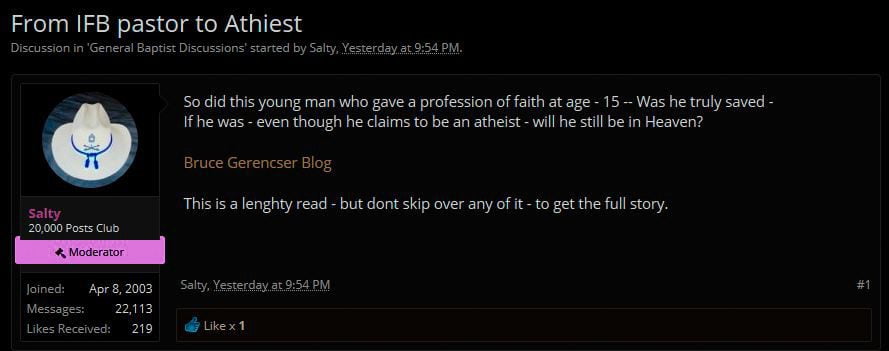
My recent post titled Dear Jesus, I Want a Refund has really made a mark and is getting a lot of attention. As I pondered what I had written, I thought about what questions people might ask me. This post is an attempt to answer one of the questions that came to mind: Bruce, If God Isn’t Real, Who is to Blame for Your Life as a Pastor?
The Dear Jesus post is written from the perspective that Jesus is God, and that he is alive and well somewhere in the Christian God’s heaven. Now, I don’t believe that to be true, but I wrote the post from that perspective because it allowed me to share with readers the emotional struggles I have faced coming to terms with how I lived my life as a devout, committed pastor. Dear Jesus allows readers to see my struggles and perhaps, in doing so, it might help them to understand their own battles with the past.
Let me be clear, I am an atheist. Anyone suggesting otherwise has failed to understand my story. If you happen to be one such doubting Thomas, I would love to know what in my journey leads you to conclude that I am not what I claim to be. Over the years, countless Evangelicals have attempted to cast doubt, suggesting that I am still a Christian; that deep down in my heart of hearts I still believe; that my writing reveals that I still yearn for a relationship with Jesus. None of these things, of course, is true. Who knows me better than yours truly? So, when I say I am an atheist, I am telling the truth. There’s no ulterior motive here, neither is there a yearning for the good old days when me are J.C. were best buds. These days, the only bud I want grows on a leafy green plant.
Ultimately, I am to blame for the decisions I made during my years as a Christian and as an Evangelical pastor. All of us are responsible for the choices we make. The issue then, is what influenced my decision-making? Why did I make these decisions? God, of course, had nothing to do with it — he doesn’t exist. Yet, for fifty years I believed God was speaking to me, directing my life, and leading me in paths of righteousness for his name’s sake. If God wasn’t speaking to me, who or what were the voices I heard? If it wasn’t God impressing on my mind certain Bible verses or decisions, who was?
I grew up in an Independent Fundamentalist Baptist (IFB) home. I was raised by parents who believed, at least outwardly, that the Christian deity was the one true God and the Bible was his revealed will for mankind. The Gerencser family attended church every time the doors were open. This stopped for the rest of my family when my parents divorced. I was fifteen at the time. Unlike my family, I continued on in the faith, attending church every time the doors were open. I believed every word in the Bible was the words of God. I believed in a God who was personally and intimately involved in my life. My parents may have forsaken the way, but I was determined to stay the course. Church friends from my high school days will tell you that I was a true-blue believer, as will my heathen friends whom I attempted to evangelize.
From my preschool years forward, my mind was bombarded with sermons and Sunday school lessons. By the time I was eighteen, I had heard almost four thousand Evangelicals sermons and lessons. Those whom I listened to had several motivations. First, they wanted to lead me to saving faith in Jesus Christ. Second, they wanted to teach me the way, truth, and life found within the pages of the King James Bible. Third, they wanted to indoctrinate me in the one true faith. Week after week and year after year, these promoters of what they believed was the old-time religion assaulted my mind with Biblical “truth.” They wanted to make sure that I was steadfast in the faith, and that when I entered the “world” my faith would stand; and it did until I was fifty years old.
At the age of fifteen, I believed God spoke to me, saying that he wanted me to be a preacher. At the age of nineteen, I enrolled in classes at Midwestern Baptist College in Pontiac, Michigan. Midwestern was known as a première IFB preacher training school (and it was cheaper than many other IFB schools). While there, I met a pretty dark-haired girl who believed God had spoken to her too. God wanted Polly to be a pastor’s wife. Both of us had minds open wide for whatever it was these great men of God were going to teach us. And for three years, our minds were pummeled with preaching and teaching that only reinforced the beliefs we entered college with.
This is not to say that I was blind to the contradictions that surrounded me; not textual contradictions, but failures of preachers and teachers to practice what they preached. During my three years at Midwestern I noticed that there was a do as I say, not as I do mentality. Girls weren’t allowed to wear slacks, but the college president’s wife and daughters were allowed to do so as long as they were away from the college. The president’s youngest daughter was permitted to single-date, while the rest of the single students were required to double-date. Dating students were not allowed to physically touch each other; that is, unless they were in one of the college’s Shakespearean productions. Then touching, kissing, and even cursing was permitted. Students were not permitted to listen to secular music, yet at the annual Valentine’s banquet, secular songs such as I’m on the Top of the World by the Carpenters were performed by college students. Silly stuff, right? But there were serious contractions too. One of the teachers was a homosexual. He lived in the dorm and often had students as his “roommates.” Homosexuality was considered a sin above all sins, yet the college administration turned a blind eye to this man’s “sin.”
During my sophomore year, a huge scandal broke out. The college basketball coach and drama department chair had an affair with the wife of the college dean. The matter was quietly and discreetly handled, with the offenders being dismissed from their jobs. Not one word was said to the student body. Gossip and complaining (griping) were swiftly and severely punished. After three years at Midwestern — having experienced and seen behaviors that were contrary to the company line — you would think that I would have had doubts about Christianity. Sadly, I didn’t. I developed a people are people approach to moral and ethical failures. The Devil and the flesh were the problems, not God and the Bible.
I left Midwestern in the spring of 1979 with a pregnant wife in tow. My faith was stronger than ever, and I was ready to make my mark as a God-called, spirit-filled preacher of the gospel. Over the course of the next four decades, my beliefs and practices would change, but my commitment to God endured. While I considered myself a progressive when I left the ministry in 2005, I still believed the basic tenets of Christianity were true.
When I look back over my life, the only conclusion I can come to when attempting to understand why I made certain decisions is that I had been deeply and thoroughly indoctrinated by Evangelical preachers and teachers. Even as a pastor, I continued to immerse myself in books that validated my beliefs. I attended conferences and special meetings that only reinforced my beliefs. Worse yet, I took my beliefs and passed them on to thousands of other people; people who saw me as a man of God; people who believed my sermons and teachings were straight from God; people who wanted someone to stand between them and God and tell them what to believe and how to live. That the churches I pastored prospered (until they didn’t) was evidence of God’s blessing. This was especially true during the eleven years I pastored Somerset Baptist Church in Southeast Ohio.
The question then, based on how I was raised and what I was taught in the churches I attended and as a college student, how could I have turned out any other way? If I were to psychoanalyze myself, I suspect I would conclude that the church became stand-in for my parents after my mom and dad divorced. I would also likely conclude that Evangelicalism fed my perfectionist, OCPD tendencies. I had a deep-seated need to be right. I also had a need to be wanted, loved, and respected. The ministry gave me all these things.
So yes, the decisions I made as an Evangelical pastor were mine, but they were not made in a vacuüm. The only way to understand how and why I made the decisions I did, including the ones the harmed me personally and my family, is to view them from a sociological or environmental perspective. The sum of my experiences affected how and why I made certain decisions. The decisions were mine, of course, but now you know why I made these choices (ignoring here, for now, discussions about whether any of us has free will).
My Christian faith rested on a Bible foundation. I believed the Bible was a supernatural book written by a supernatural God. The Bible was God’s roadmap or blueprint for my life and the lives of my wife and children. It was only when I learned that the Bible was not what Evangelicals claim it is that my Christian house came tumbling to the ground. Once I understood that the Bible was written by fallible, errant men, and that it was not in any way inspired, inerrant, or infallible, I was then free, for the first time, to seriously and thoroughly investigate the claims of Christianity. And when I did, I found out that the emperor had no clothes, and that the wizard behind the screen was self, not God. Understanding this ripped my life to shreds, forcing me to rebuild it from the ground up. Every former belief and presupposition was investigated and tossed aside. At the age of fifty, I was forced (or better put, had the opportunity) to build my life anew. I am blessed to have my wife and children walking along with me as I find my way through this wild, woolly world. My writing is my way of helping those who may be where I once was or who have recently exited the cult. I am not an expert or an authority, but I am one man who knows that it is possible to live a wonderful, abundant, satisfying life post-Jesus. I hope, by telling my story, that people will see that a good life is possible without all the religious baggage. And sleeping in on Sundays? Priceless….
About Bruce Gerencser
Bruce Gerencser, 60, lives in rural Northwest Ohio with his wife of 39 years. He and his wife have six grown children and eleven grandchildren. Bruce pastored Evangelical churches for twenty-five years in Ohio, Texas, and Michigan. Bruce left the ministry in 2005, and in 2008 he left Christianity. Bruce is now a humanist and an atheist. For more information about Bruce, please read the About page.
Bruce is a local photography business owner, operating Defiance County Photo out of his home. If you live in Northwest Ohio and would like to hire Bruce, please email him.
Thank you for reading this post. Please share your thoughts in the comment section. If you are a first-time commenter, please read the commenting policy before wowing readers with your words. All first-time comments are moderated. If you would like to contact Bruce directly, please use the contact form to do so.
Donations are always appreciated. Donations on a monthly basis can be made through Patreon. One-time donations can be made through PayPal.





 Having been an Evangelical pastor for twenty-five years and now a card-carrying member of Satan’s atheistic horde, I have gained a bit of notoriety that attracts people doing studies about clergymen who have left the ministry and lost their faith. I am a rare duck in one respect: most men and women who leave the ministry do so when they are younger. In my case, I was fifty years old before I turned in my ministerial union card. My counselor told me that it is rare for pastors my age to walk away from a lifetime of ministry, even if they no longer believe. (Please read
Having been an Evangelical pastor for twenty-five years and now a card-carrying member of Satan’s atheistic horde, I have gained a bit of notoriety that attracts people doing studies about clergymen who have left the ministry and lost their faith. I am a rare duck in one respect: most men and women who leave the ministry do so when they are younger. In my case, I was fifty years old before I turned in my ministerial union card. My counselor told me that it is rare for pastors my age to walk away from a lifetime of ministry, even if they no longer believe. (Please read 


